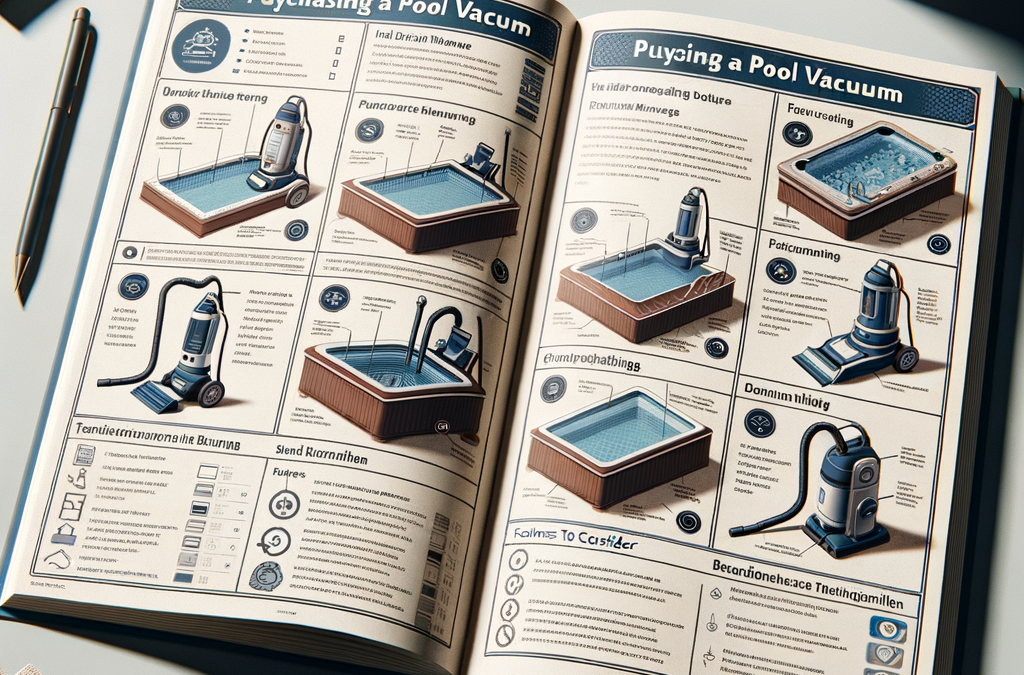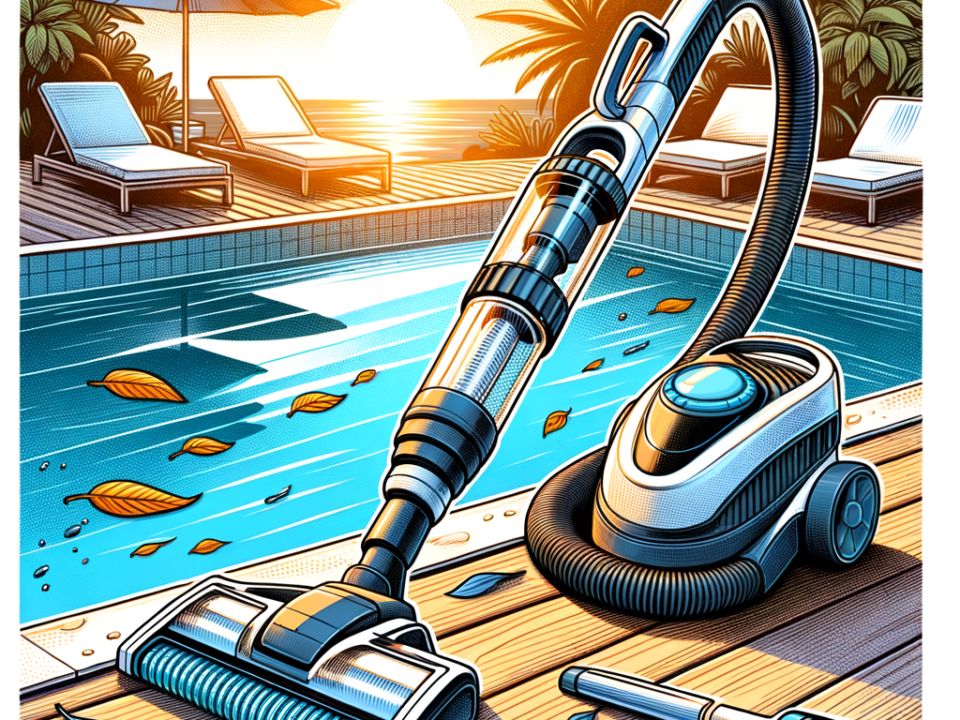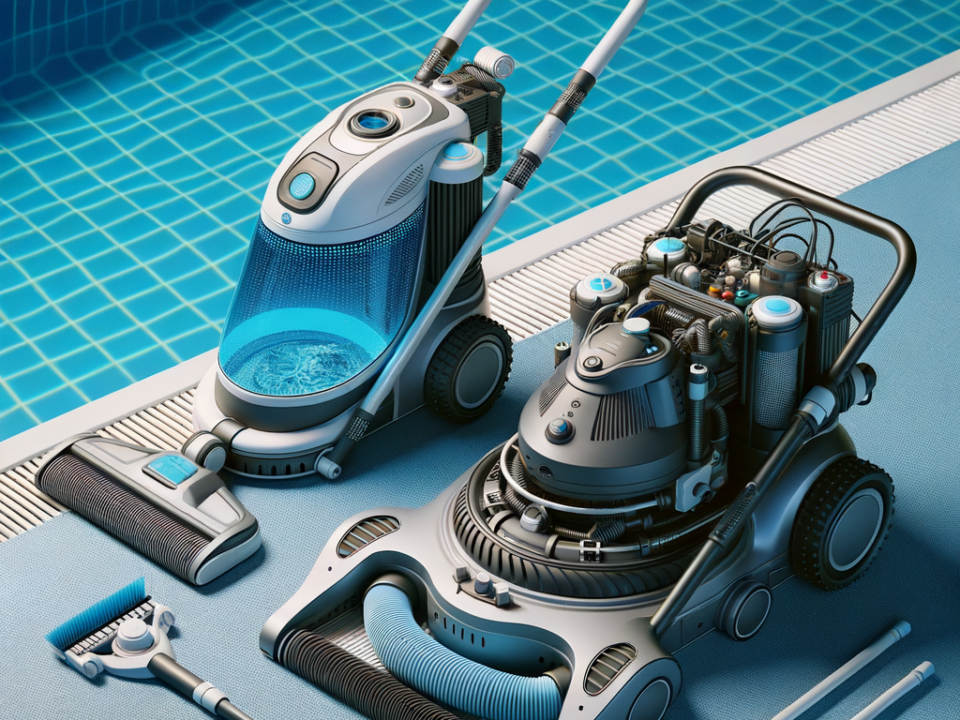
How to Vacuum Your Pool Super Quick Master Your Pool Vacuum for Super Quick Results
April 7, 2024
Ultimate Guide to Pool Fun: Best Handheld Vacuums, Adult Swim Rings & More!
April 23, 2024“Master the Art of Pool Cleaning: Your Ultimate Guide to Buying the Perfect Pool Vacuum.”
Table of Contents
Introduction
The Pool Vacuum Buying Guide: Everything You Need to Know Before You Buy is a comprehensive resource designed to assist potential buyers in making an informed decision when purchasing a pool vacuum. This guide covers all the essential aspects, from understanding the different types of pool vacuums available in the market, their features, benefits, and drawbacks, to providing tips on how to choose the right one based on your specific needs and budget. It also includes information on how to maintain and troubleshoot common issues with pool vacuums. This guide aims to simplify the buying process and ensure that you invest in a pool vacuum that best suits your requirements and enhances your pool cleaning routine.
Navigating Your Pool Vacuum Purchase: Essential Tips and Tricks
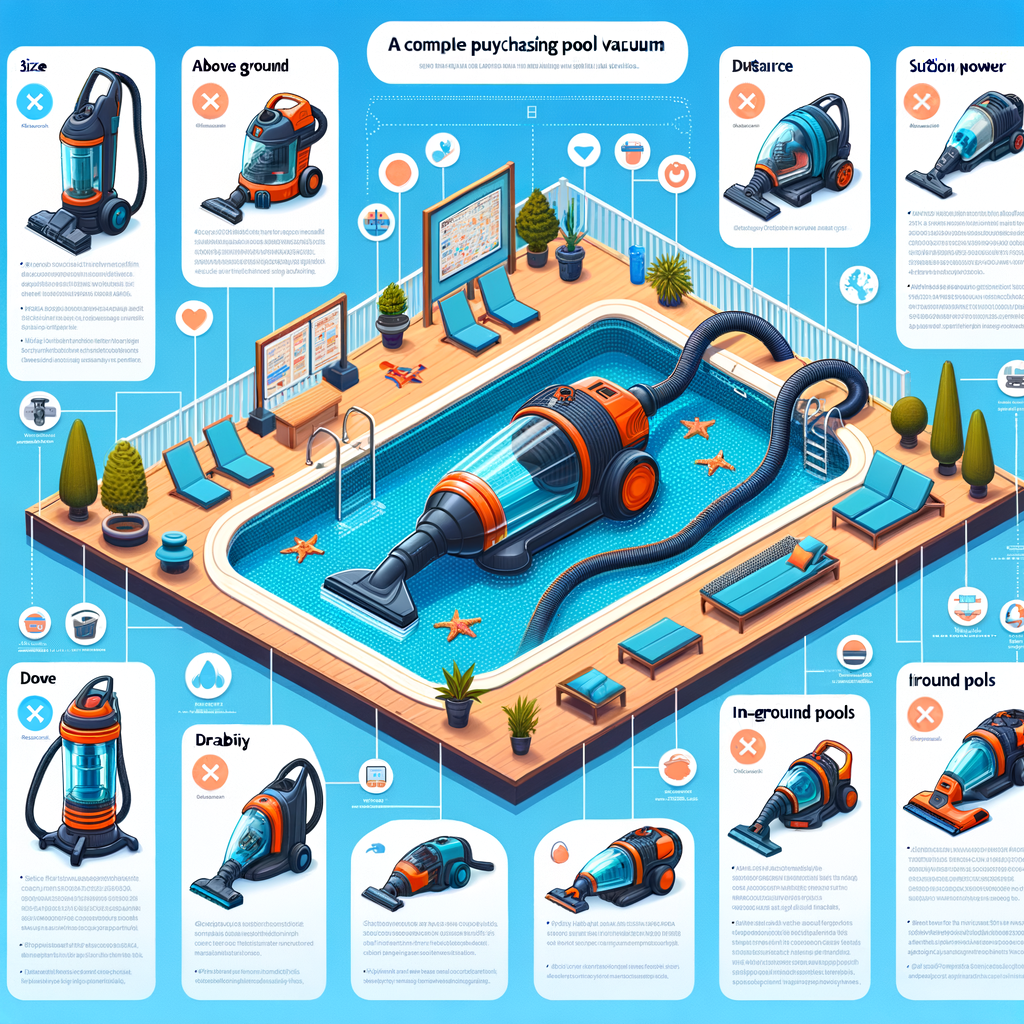
When it comes to maintaining a clean and inviting swimming pool, a pool vacuum is an indispensable tool. This device is designed to remove debris, dirt, and algae from the pool, ensuring a safe and hygienic swimming environment. However, with a plethora of options available in the market, choosing the right pool vacuum can be a daunting task. This article aims to provide essential tips and tricks to navigate your pool vacuum purchase.
Firstly, understanding the different types of pool vacuums is crucial. There are primarily three types: manual, automatic, and robotic. Manual vacuums are the most affordable and require human intervention for operation. Automatic vacuums, on the other hand, are self-propelling and can clean the pool without much supervision. Robotic vacuums are the most advanced, equipped with smart features like programmable cleaning cycles and remote control operation.
When selecting a pool vacuum, consider the size and shape of your pool. For smaller pools, a manual vacuum may suffice. However, for larger pools or those with complex shapes, an automatic or robotic vacuum would be more efficient. Additionally, the type of debris commonly found in your pool should also influence your decision. For instance, if your pool is frequently littered with large leaves, a vacuum with a larger debris bag would be ideal.
Next, consider the vacuum’s power source. Manual vacuums typically connect to the pool’s filtration system, while automatic and robotic vacuums may require an external power source. If you opt for a battery-powered vacuum, ensure it has a long battery life to avoid frequent recharging.
Ease of use is another important factor. A pool vacuum should be easy to assemble, operate, and maintain. Look for models with clear instructions and user-friendly features. For instance, a vacuum with a transparent debris bag allows you to see when it’s full and needs emptying.
Durability is also a key consideration. A pool vacuum is a significant investment, and you want it to last. Opt for models made from high-quality, corrosion-resistant materials. Additionally, check the warranty period. A longer warranty often indicates the manufacturer’s confidence in the product’s durability.
Lastly, consider your budget. While it’s tempting to go for the cheapest option, remember that you often get what you pay for. A cheap vacuum may end up costing more in the long run due to frequent repairs or replacements. Instead, aim for a balance between cost and quality.
In conclusion, buying a pool vacuum requires careful consideration of several factors. By understanding the different types of vacuums, considering the size and shape of your pool, the type of debris, the power source, ease of use, durability, and your budget, you can make an informed decision. Remember, the goal is to choose a vacuum that will effectively clean your pool and serve you for a long time. With these tips and tricks, navigating your pool vacuum purchase should be a breeze.
The Ultimate Pool Vacuum Buying Guide: What You Need to Know Before You Buy
When it comes to maintaining a clean and inviting swimming pool, a pool vacuum is an essential tool. This device helps to remove debris, dirt, and algae from the pool, ensuring that the water remains clear and safe for swimming. However, with a plethora of options available in the market, choosing the right pool vacuum can be a daunting task. This article aims to provide a comprehensive guide to help you make an informed decision before purchasing a pool vacuum.
Firstly, it’s crucial to understand the different types of pool vacuums available. The most common types include manual pool vacuums, automatic pool vacuums, and robotic pool vacuums. Manual pool vacuums are the most affordable and require manual operation, making them ideal for small pools or spas. Automatic pool vacuums, on the other hand, are self-propelled and can clean the pool without much human intervention. Robotic pool vacuums are the most advanced and efficient, capable of cleaning the pool’s floor, walls, and steps, but they come with a higher price tag.
The size and shape of your pool are also significant factors to consider when choosing a pool vacuum. For instance, if you have a large pool, an automatic or robotic vacuum would be more efficient and less labor-intensive. Conversely, a manual vacuum would suffice for a small or medium-sized pool. Similarly, if your pool has a lot of curves or hard-to-reach areas, a robotic vacuum with advanced navigation capabilities would be the best choice.
The type of debris your pool accumulates is another important consideration. If your pool is surrounded by trees and tends to collect a lot of leaves, a vacuum with a large debris bag and strong suction power would be ideal. On the other hand, if your pool mainly collects fine debris like sand or silt, a vacuum with a fine filtration system would be more suitable.
The pool’s surface material can also influence the choice of pool vacuum. Some vacuums are designed to work best on vinyl surfaces, while others are more suited for concrete or fiberglass. Therefore, it’s essential to choose a vacuum that is compatible with your pool’s surface to prevent damage and ensure efficient cleaning.
Ease of use and maintenance are other factors to consider. A pool vacuum should be easy to set up, operate, and maintain. Look for a model with clear instructions and user-friendly features. Additionally, consider the cost and availability of replacement parts. A vacuum with readily available and affordable parts will be easier and cheaper to maintain in the long run.
Lastly, consider your budget. Pool vacuums can range from affordable to high-end, with varying features and capabilities. While it might be tempting to go for the cheapest option, it’s important to consider the vacuum’s efficiency, durability, and maintenance costs. Sometimes, investing in a slightly more expensive model can save you money in the long run due to its superior performance and longevity.
In conclusion, buying a pool vacuum requires careful consideration of various factors, including the type of vacuum, the size and shape of your pool, the type of debris, the pool’s surface material, ease of use and maintenance, and your budget. By taking these factors into account, you can choose a pool vacuum that will effectively keep your pool clean and inviting, providing you with a refreshing and enjoyable swimming experience.
Key Factors to Consider When Purchasing a Pool Vacuum
When it comes to maintaining the cleanliness and hygiene of your swimming pool, a pool vacuum is an indispensable tool. This device helps to remove debris, leaves, and other unwanted materials from the pool, ensuring a clean and safe swimming environment. However, with the myriad of options available in the market, choosing the right pool vacuum can be a daunting task. This article aims to guide you through the key factors to consider when purchasing a pool vacuum.
Firstly, it is crucial to consider the type of pool vacuum that suits your needs. There are three main types: manual, automatic, and robotic pool vacuums. Manual vacuums are the most affordable and give you complete control over the cleaning process, but they require more effort and time. Automatic vacuums, on the other hand, are more convenient as they can clean the pool without your intervention. Robotic vacuums are the most advanced and efficient, but they come with a higher price tag.
The size and shape of your pool are also significant factors to consider. If you have a small or medium-sized pool, a manual or automatic vacuum would suffice. However, for larger pools, a robotic vacuum would be more efficient. Similarly, if your pool has a lot of curves or hard-to-reach areas, a robotic vacuum with advanced navigation capabilities would be ideal.
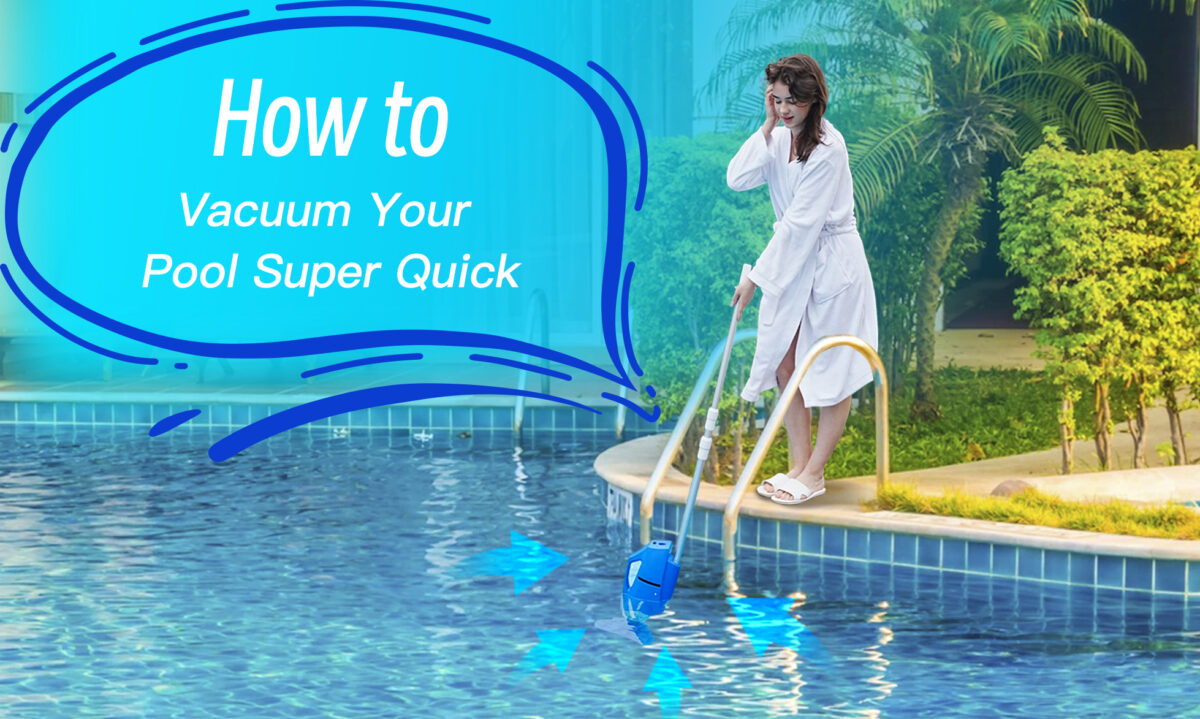
The type of debris your pool accumulates is another important consideration. If your pool is surrounded by trees and tends to collect a lot of leaves, you might want to opt for a vacuum with a large debris bag. On the other hand, if your pool mostly collects fine particles like sand or silt, a vacuum with a fine filtration system would be more suitable.
The ease of use and maintenance of the pool vacuum should not be overlooked. A vacuum that is easy to assemble, operate, and maintain will save you a lot of time and effort. Look for a vacuum with clear instructions, user-friendly controls, and easy-to-clean parts.
The durability and warranty of the pool vacuum are also key considerations. A vacuum made of high-quality, durable materials will last longer and give you better value for your money. Additionally, a vacuum with a good warranty will give you peace of mind, knowing that you are covered in case of any defects or issues.
Lastly, consider your budget. Pool vacuums come in a wide range of prices, from affordable manual vacuums to high-end robotic models. While it might be tempting to go for the cheapest option, remember that you often get what you pay for. A more expensive vacuum might have a higher upfront cost, but it could save you money in the long run due to its efficiency, durability, and lower maintenance costs.
In conclusion, purchasing a pool vacuum requires careful consideration of several factors, including the type of vacuum, the size and shape of your pool, the type of debris, ease of use and maintenance, durability and warranty, and your budget. By taking these factors into account, you can make an informed decision and choose a pool vacuum that best meets your needs and ensures a clean and enjoyable swimming experience.
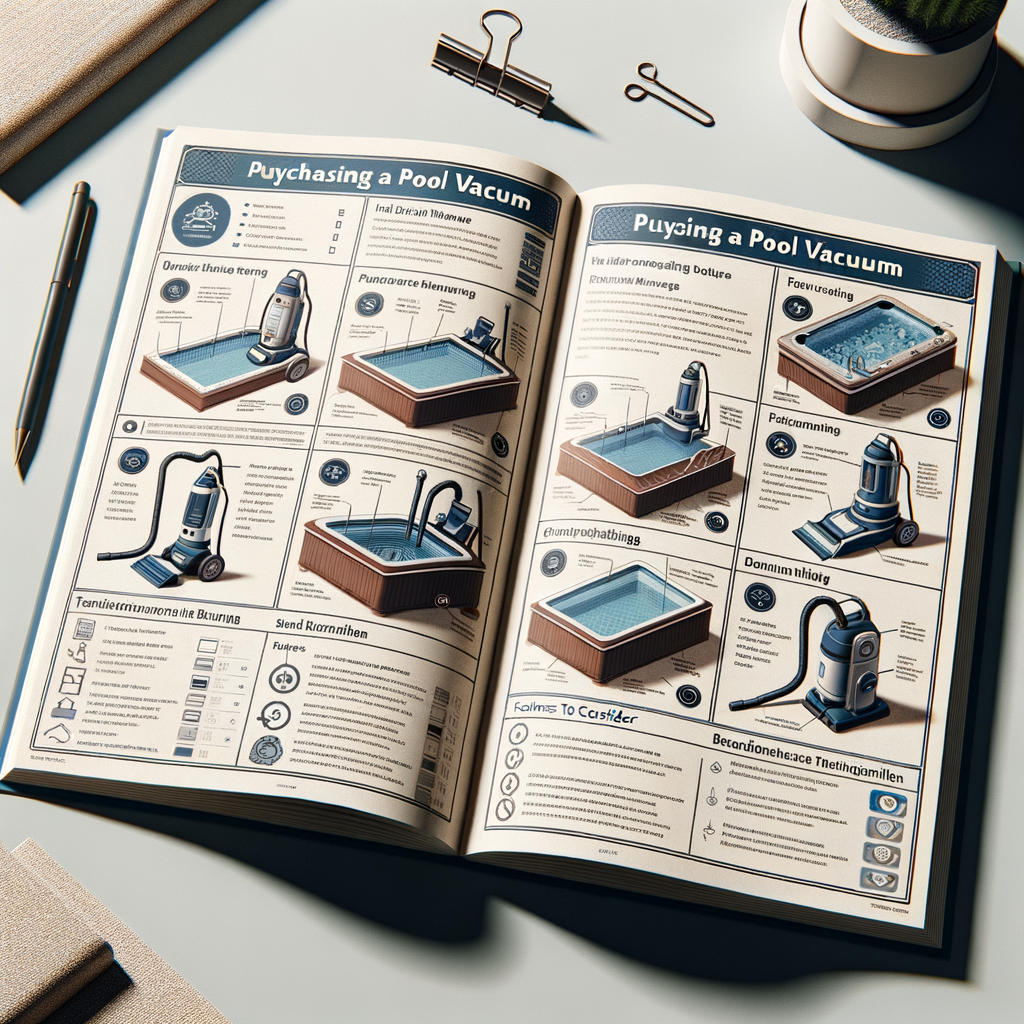
Understanding Different Types of Pool Vacuums: A Comprehensive Buying Guide
When it comes to maintaining a clean and inviting swimming pool, a pool vacuum is an essential tool. This device helps to remove debris, dirt, and algae from the pool, ensuring a safe and enjoyable swimming experience. However, with a myriad of options available in the market, choosing the right pool vacuum can be a daunting task. This article aims to provide a comprehensive buying guide to help you understand the different types of pool vacuums and make an informed decision.
Firstly, it’s important to understand that pool vacuums come in three main types: manual pool vacuums, automatic suction-side pool vacuums, and robotic pool vacuums. Each type has its unique features, benefits, and drawbacks, and the best choice depends on your specific needs and preferences.
Manual pool vacuums are the most basic and affordable type. They require manual operation, meaning you’ll need to physically move the vacuum around the pool to clean it. This type of vacuum is ideal for small pools or spas and for those who don’t mind putting in a bit of elbow grease. However, they can be time-consuming to use, especially for larger pools.
On the other hand, automatic suction-side pool vacuums are a step up from manual vacuums. They attach to your pool’s existing filtration system and use the suction power to move around the pool and pick up debris. These vacuums are relatively easy to install and operate, making them a popular choice for many pool owners. However, they can put extra strain on your pool’s filtration system and may not be as effective at cleaning larger debris.
Lastly, robotic pool vacuums are the most advanced and efficient type. They operate independently of your pool’s filtration system and use electricity to power their movement and suction. These vacuums come with built-in filters, can climb walls, and often have smart features like programmable cleaning cycles and remote control operation. While they offer the best cleaning performance, they are also the most expensive.
When choosing a pool vacuum, it’s also crucial to consider factors like the size and shape of your pool, the type and amount of debris it typically collects, and your budget. For instance, if you have a large pool or if your pool collects a lot of large debris like leaves, a robotic pool vacuum would be the best choice despite its higher cost. On the other hand, if you have a small pool and a tight budget, a manual or suction-side vacuum would suffice.
In addition, consider the maintenance requirements of the vacuum. Some vacuums require regular cleaning and replacement of parts, which can add to the overall cost and effort of maintaining your pool. Robotic vacuums, for instance, require regular cleaning of their built-in filters, but they save you the effort of manual cleaning.
In conclusion, understanding the different types of pool vacuums and their features can help you make an informed decision when buying a pool vacuum. Whether you choose a manual, suction-side, or robotic vacuum, ensure it suits your pool’s needs and your budget. Remember, the goal is to maintain a clean and safe swimming environment, and the right pool vacuum can make this task much easier.
Conclusion
In conclusion, purchasing a pool vacuum requires careful consideration of several factors. These include the type of pool, its size, the kind of debris it usually collects, and the budget. Understanding the different types of pool vacuums available, their features, pros, and cons is crucial. Additionally, factors such as ease of use, maintenance, durability, and efficiency should also be taken into account. Therefore, a comprehensive understanding of all these aspects can help in making an informed decision when buying a pool vacuum.

